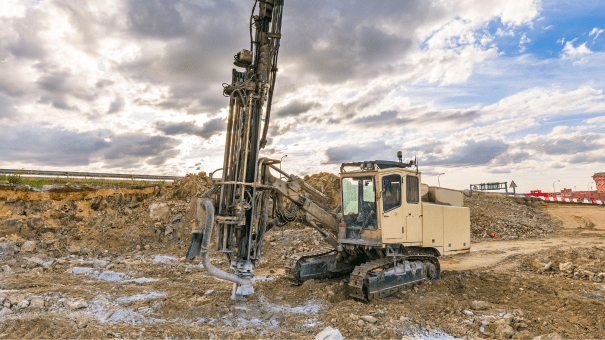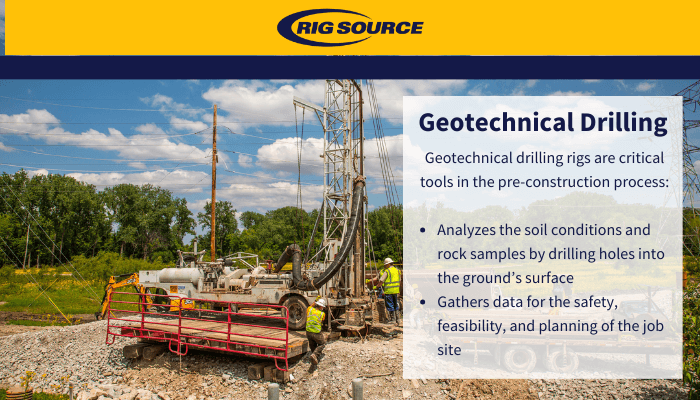A Comprehensive Overview: All About Geotechnical Engineering and Its Applications
A Comprehensive Overview: All About Geotechnical Engineering and Its Applications
Blog Article
The Importance of Geotechnical Design in Addressing Environmental Difficulties and Enhancing Construction Safety
Geotechnical engineering serves as a foundation in the intersection of ecological stewardship and building safety, offering important insights into the actions of dirt and rock under various problems. By applying strategic website examinations and tailored reduction measures, geotechnical engineers play an important role in guarding both human lives and ecological honesty.

Duty of Geotechnical Design
Geotechnical engineering plays a crucial role in the layout and building and construction of framework by attending to the actions of soil and rock products under various conditions. This field of engineering is necessary for recognizing the communication in between structures and the ground, that includes determining the load-bearing ability of dirt, evaluating security, and predicting prospective settlement or failure.
Geotechnical engineers are in charge of conducting website examinations, which involve sampling and screening dirt and rock to collect data on their physical and chemical buildings. This details is vital for creating structures, maintaining walls, and various other earth-retaining structures that guarantee security and durability. Moreover, geotechnical engineering notifies the option of suitable construction methods and materials, thus lessening risks linked with soil behavior.
Moreover, the assimilation of geotechnical design concepts into urban preparation and ecological administration is important for addressing difficulties such as ground contamination and groundwater management. By comprehending geotechnical variables, designers can establish lasting remedies that improve the strength of infrastructure versus all-natural threats, while also promoting ecological stewardship. Inevitably, the role of geotechnical engineering is important for accomplishing secure, durable, and eco aware construction practices.
Soil Disintegration Mitigation
Dirt erosion positions a significant danger to both environmental stability and facilities honesty, affecting about 24 billion loads of productive soil lost annually worldwide. This phenomenon is exacerbated by aspects such as logging, urbanization, and bad farming methods. Geotechnical design plays a critical function in developing effective soil erosion mitigation techniques that protect both the environment and building jobs.
One strategy entails the implementation of erosion control techniques such as vegetation planting, which stabilizes soil via root systems. Furthermore, the building of maintaining wall surfaces and balconies can efficiently minimize surface area drainage and protect vulnerable locations from erosion. Correct drainage style is additionally vital; it reduces water build-up and guides excess overflow far from critical frameworks.
In addition, geotechnical engineers utilize soil stabilization techniques, such as the application of geotextiles and biodegradable floor coverings, to boost dirt communication and prevent degradation - all about geotechnical engineering. Normal surveillance and analysis of erosion-prone websites enable prompt treatments, making sure lasting sustainability. By integrating these strategies, geotechnical engineering not only mitigates the influences of soil erosion yet also contributes to the resilience of facilities against ecological difficulties, ultimately fostering a more secure and a lot more sustainable constructed atmosphere
Groundwater Security Strategies
Groundwater works as an essential resource for drinking water, farming, and industrial procedures, making its protection essential for environmental sustainability and public health. Efficient groundwater security strategies are vital in minimizing contamination threats and making certain the durability of this source.

Regular surveillance of groundwater quality is likewise important, making it possible for very early discovery of contamination sources and facilitating timely removal efforts. Utilizing innovative technologies, such as geophysical surveys and remote picking up, help in identifying possible threats to groundwater reserves.
In addition, public education and stakeholder interaction her comment is here are critical, cultivating area support for groundwater defense efforts. all about geotechnical engineering. By incorporating governing steps, technical advancements, and neighborhood involvement, we can create an extensive framework that safeguards groundwater sources while advertising sustainable growth and construction methods
Landslide Danger Monitoring
Landslides present significant hazards to both human safety and security and facilities, making reliable risk management approaches essential. Geotechnical engineering plays an important duty in identifying, assessing, and mitigating landslide dangers. A comprehensive understanding of incline stability, soil auto mechanics, and hydrology is vital for creating reliable risk monitoring plans.
The initial step in landslide risk administration involves complete website investigations, that include geological mapping and soil testing. These examinations help engineers examine the possibility for landslides by determining crucial aspects such as incline angles, dirt composition, and water content. Making use of advanced innovations such as remote sensing and geophysical surveys can improve the precision of these analyses.
Once dangers are identified, proper mitigation procedures can be carried out. These might include design options such as preserving walls, drain systems, and incline stabilization techniques. Furthermore, keeping track of systems ought to be developed to spot signs of ground activity and changes in water degrees, enabling aggressive interventions.

Enhancing Building And Construction Safety
Building sites commonly provide a myriad of important link hazards that can threaten worker safety and security and task integrity. Geotechnical engineering plays an important role in boosting building and construction security by supplying essential understandings right into subsurface conditions. Through detailed soil and rock analysis, geotechnical designers can recognize possible risks, such as dirt instability, groundwater problems, and seismic vulnerabilities, which may endanger the safety of construction tasks.
Implementing geotechnical remedies, such as appropriate foundation layout and the use of retaining structures, reduces these dangers substantially. These remedies not just guarantee the security of the structures being built but also develop a much safer working environment for building employees.
Moreover, promoting a culture of safety and security via training and adherence to developed safety and security methods additionally enhances building and construction website safety and security. By incorporating geotechnical expertise right into the preparation and implementation phases, building and construction jobs can accomplish higher security standards, ultimately securing workers and making certain effective project conclusion.
Conclusion
To conclude, geotechnical design works as additional info a critical self-control in advertising and dealing with ecological obstacles building and construction security. Via reliable dirt disintegration reduction, groundwater protection strategies, and landslide danger monitoring, geotechnical designers add to the development of durable facilities. The assimilation of these practices cultivates a much safer building environment and improves the sustainability of civil design jobs. Ultimately, the proficiency of geotechnical engineers is essential in securing both natural deposits and human lives against prospective risks.
Geotechnical design serves as a foundation in the junction of ecological stewardship and building security, offering vital understandings into the behavior of soil and rock under different conditions. Geotechnical design notifies the choice of ideal building and construction approaches and materials, thus reducing dangers linked with soil behavior.
Geotechnical design plays a crucial duty in establishing effective soil erosion mitigation approaches that safeguard both the atmosphere and building and construction jobs.
Furthermore, geotechnical engineers employ soil stabilization strategies, such as the application of geotextiles and naturally degradable mats, to boost dirt cohesion and avoid deterioration. Through thorough soil and rock analysis, geotechnical engineers can identify possible dangers, such as dirt instability, groundwater issues, and seismic vulnerabilities, which might compromise the safety and security of building activities.
Report this page